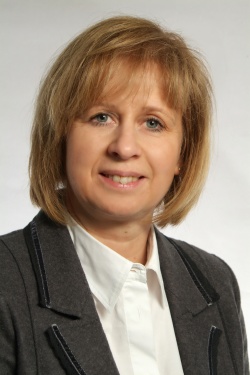Management I
Successful TopSharing
In the late 1990s, management consultant Julia K Kuark and Swiss communication consultant Hans Ulrich Locher coined the term ‘TopSharing’ – as in job-sharing but, in this case, to describe splitting a senior management role. In Germany, Dr Ulrike Ley, who coaches female doctors, considers the TopSharing model, expanded over a decade by Kuark, is a valid management model for hospitals. TopSharing helps male and female physicians to achieve a work/life balance by showing the way to split and share various management and administrative tasks, thus also gaining more time for patient care.
Report: Bettina Döbereiner

Female physicians, as well as their male colleagues, struggle to achieve a sound career/family life. Cardiologists Katrin Glass and Reina Dobberkau are among the lucky few who became successful ‘TopSharers’ in a senior clinical role. Since 2011 the two physicians have jointly headed the cardiology department at the private 80-bed Brunnenberg MediClin hospital, a German rehabilitation facility near the border with the Czech Republic.
The idea of sharing a senior management position
‘At the same time as my predecessor retired I also wanted to return to the hospital after my extended maternity leave,’ Dr Reina Dobberkau explained. ‘Whilst the hospital was already struggling with a clinical staff shortage, I didn’t want a full-time senior consultancy due to my family situation. Katrin Glass, whom I’d met during my medical training and with whom I had cooperated frequently, headed the cardiology department at a nearby clinic. Her institution also suffered a staff shortage and the workload was extremely high. We jointly developed the idea of sharing the management position and presented our idea to the group’s top management. Their reaction was very positive.’ What drew Katrin Glass in the same direction?
‘I had always wanted to balance my career with my family life,’ she explained. ‘I live in a multi-generation house and, to me, my family tasks are as important as my passion for my profession and my career.
Reina Dobberkau: ‘The hospital group’s top management gave their OK very quickly. For the group, having two permanent specialists represented a clear, competitive advantage.
‘By law, the statutory pension insurers in Germany will only fund cardiological rehabilitation if two cardiologists are permanently employed in a facility. Consequently, our department was at risk of being shut down if we had not come up with our job-sharing scheme.’
Role organisation
Katrin Glass: ‘We both work 80 percent of a full-time position, which means we are both there four days a week and are off one day. This is a fixed set-up, of which everyone in the hospital is aware.
‘We discuss and jointly decide all important administrative and clinical issues and we both sign the patients’ discharge reports. Obviously there are tasks we do not share, such as patient care and certain tasks assigned to us by the hospital management, clinical responsibility for nursing care, for example, or the psychology department.
‘We split human resources issues, such as appraisals of clinical and non-clinical staff between us and, although we don’t take verbatim minutes that contain each detail and each single word, we always document all relevant statements and decisions in a transparent and comprehensible way. With a bit of experience, that works very well.’
Necessary preconditions for TopSharing
Reina Dobberkau: ‘Cooperation is crucial. You can’t just take any two physicians and ask them to share a position. While friendship, as it has developed between Ms Glass and me, is certainly not a precondition for successfully sharing a senior clinical management role, similar levels of clinical training are of utmost importance to ensure efficient clinical communication – after all, the two physicians have to stand in for each other. In addition, similar levels are necessary to avoid competition.’
Katrin Glass: ‘Another important issue is the employer’s support – he has to be willing to consider the idea of TopSharing in the first place; and you have to be able to convince him; you have to present a clear, well thought-out concept.
‘Then, when you do share your job, you need to organise your work well and you need discipline. The latter includes the fact that decisions, once made, are accepted and not questioned. What else is important for TopSharing? Open-ness, trust and the willingness to negotiate compromises.’
Big TopSharing advantages
Reina Dobberkau: One major advantage is the fact that TopSharing opens up family time, your private life. When we’re in the hospital we work long hours, which in fact means we work more than 80 percent of a full-time position – but we still have more time for the family. When we are off, we are off not only physically but also mentally, because we can be sure that our patients are well taken care of by the colleague.
Another issue, which I consider very important, is the fact that there is another professional with whom I can discuss and exchange ideas. We have our patients and when questions arise there is always the other cardiologist next door to turn to for feedback.’
Katrin Glass: ‘One of the major advantages I see is that we share responsibility. Obviously, we do have different opinions from time to time, but we always manage to find a consensus, and before we “go public” we’ve come to an agreement. TopSharing is, no doubt, not always easy. There are difficult days, but there are difficult days in any clinical environment, particularly when you have a tough workload. However, summing up, the advantages of our work model far outweigh the problems.’
PROFILES:
A specialist in internal medicine, with a focus on cardiology, Reina Dobberkau, studied medicine at Karl Marx University, Leipzig, and then became a junior physician at several hospitals in Vogtland, Germany. Her doctoral thesis (1996) focused on hygiene issues related to reprocessing endoscopes. In 1997, Dr Dobberkau joined Vogtlandklinik Bad Elster for cardiology training, as did Katrin Glass. In 2001, she was appointed senior physician in the Brunnenberg cardiology department, where she became head of the unit in 2010 – and, in January 2011, joint head with Dr Glass.
A specialist in internal medicine with a focus on cardiology, Katrin Glass had studied medicine at Karl Marx University in Leipzig. Following training in internal medicine at several hospitals in Vogtland, Germany, in 1989 she joined the cardiology department of Vogtlandklinik Bad Elster where she was appointed senior physician in 1992 and department head in 2007. Since January 2011 Dr Glass, alongside Dr Rena Dobberkau, has jointly led the cardiology department at Brunnenberg MediClin hospital, a rehabilitation centre in Bad Elster. There, the team of one senior physician and two junior physicians covers post-acute care of cardiovascular diseases.
29.04.2015










